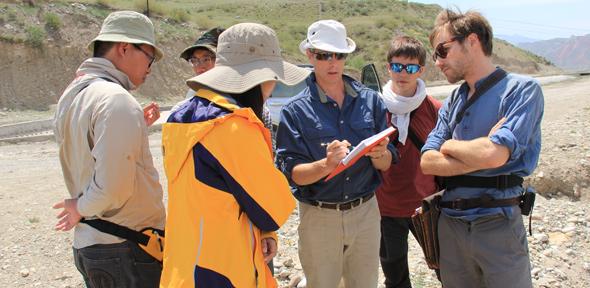
The University of Cambridge's Department of Earth Sciences is developing an innovative approach to understanding the physical processes which generate destructive earthquakes and tsunamis.
Professor Jean-Philippe Avouac, who is the first BP Foundation McKenzie Professor of Earth Sciences, will lead the research team. The initiative has been made possible by the gift of an endowed Professorship from the BP Foundation to Cambridge in America, the alumni and development office for the University and its constituent colleges in the US.
Jean-Philippe Avouac has an international reputation for crossing traditional academic boundaries in his research and is the former Director of the Tectonics Observatory at Caltech. In his inaugural lecture this week, ‘When the Monsoon rocks the Himalaya', he will highlight the cross-boundary approaches used to investigate deformation of the earth crust and earthquakes and the significant advances which have arisen from them.
Avouac explained: “The Himalaya is an exceptional example of an active mountain range where the processes which have shaped it over tens of millions of years can still be observed at work.
“A most intriguing observation is that strain and seismic activity in the Himalaya varies seasonally. As the Himalaya rises in response to the huge forces generated by the Earth’s internal dynamics, it also shows a surprising sensitivity to very small stress changes induced by the monsoon. As the rain falls, it soaks through the ground and slightly alters the stress. By observing the effects on seismicity, we are gaining insight into the laws governing the initiation of earthquakes.
“Another observation is that faults can either stick and accumulate stress to be released in future earthquakes, or creep along quietly with little seismic hazard. We still don’t understand the factors promoting one or the other behaviour. Understanding these factors is crucial as they ultimately determine the level of seismic hazard.”
“I believe that a better understanding of these factors, together with the development of physics-based numerical models of fault behaviour, will revolutionize our ability to evaluate the probability and characteristics of future large earthquakes and tsunamis.”
Integrating numerical models of fault behaviour with the nature of the fault-zone rock, temperature, fluid pressure and fluid chemistry will advance our ability to assess how seismic hazard is modified when fluids are injected into the crust; this is particularly relevant to CO2 storage, geothermal energy and hydraulic fracturing.
The new research team in Cambridge will investigate how faults respond to small stress changes and focus on why some faults stick and accumulate elastic strain while others creep. They will investigate the nature of the fault-zone rock, temperature, fluid pressure and fluid chemistry, together with the development of physics-based numerical models of fault behaviour.
Avouac will combine observations from monitoring earthquake-prone areas, including some major faults in the Himalaya, and Taiwan, using field sensors such as seismometers, GPS stations, remote sensing from space and computer modelling.
The chair is named after Dan McKenzie, CH, FRS, Emeritus Professor of Earth Sciences, and established at the University of Cambridge with funding awarded by the BP Foundation, in recognition of Professor McKenzie’s contributions to Earth Sciences which have included fundamental insights into plate tectonics, the origin of sedimentary basins and mantle convection. In addition to the endowment of the Professorship, the BP Foundation also awarded funds for support of related research activities.
Head of Earth Sciences at Cambridge Professor James Jackson said:
“This new professorship will strengthen the academic and intellectual leadership at the highest level. It will also help us to provide students with the tools to deal with the enormous future challenges of energy, natural resources, natural hazards and environmental protection.”
David Eyton, BP Group Head of Technology said:
"The BP Foundation is pleased to endow the BP Foundation McKenzie Professorship, in recognition of Professor Dan McKenzie's unique and innovative contribution to science. We trust this Chair will enable the University to build on the legacy of his tremendous achievements. This endowment also recognizes the world-leading status of the Department of Earth Science at the University of Cambridge, and Professor McKenzie's inspiration of generations of students there. We are therefore delighted to see the Chair passing to an academic with such an outstanding reputation for innovation in this field, and with the same deep insight and the gracious, open style as the Chair’s namesake."
To mark his appointment, Professor Avouac will deliver his inaugural lecture on Thursday 27 November, from 5pm, in the Tilley Lecture Theatre, Department of Earth Sciences, Downing Street.
